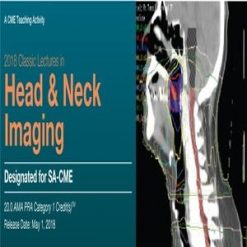ASTRO Practical Radiation Oncology Program 2023 (Videos)
$35
ASTRO Practical Radiation Oncology Program 2023
Program
The program is comprised of ten sessions:
Updates in Breast Cancer: Hypofractionation, Treatment Techniques, and Systemic Therapy
Hypofractionation for Breast Cancer—Nicolas Prionas, MD, PhD
Breast Radiation Techniques and Motion Management—Jolinta Lin, MD
Advances in Systemic Therapy for Breast Cancer—Cathie Chung, MD
The Who, What and How of Sarcoma
Overview of Sarcoma—Manpreet Bedi, MD, MS
Multidisciplinary Management of Sarcoma—Andrew Bishop, MD
Unresectable and Metastatic Disease—Anusha Kalbasi, MD
Radiation Technique and Case Presentation—Shauna Campbell, MD, DO
Treatment and Management of Larynx Cancer
Early Stage Larynx Cancer—David Sher, MD, MPH
Locally Advanced Larynx Cancer—Zain Husain, MD
Treatment Strategies in Post Operative and Recurrent Larynx Cancer—Gary Walker, MD, MS, MPH
Updates in Lung Cancer Management
Current Management of Stage III Non Small Cell Lung Cancer—Saumil Gandhi, MD, PhD
Non Definitive Lung Options: Palliation and XRT Alone—Uzoma Iheagwara, MD, PhD
Small Cell Lung Cancer Treatment Volumes—Sara Zakem, MD, BS
Reirradiation for Prostate, CNS and Head and Neck Cancers
Reirradiation for Local Recurrence of Prostatic Carcinoma—Abhishek Solanki, MD, MS
Reirradiation in Primary and Metastatic CNS Malignancy—Susan McGovern, MD, PhD
Pro Retreatment: Head and Neck—James Caudell, MD, PhD
Inoperable/Recurrent Endometrial Cancer and Building a Brachytherapy Practice in a Community Setting
Inoperable Endometrial Cancer—J. Spencer Thompson, MD
Recurrent Endometrial Cancer—Emma Fields, MD
Implementing a Successful Brachytherapy Program in the Community—Malolan Rajagopalan, MD, MBA
Management of Primary Brain Tumors in the Molecular Era and Building and Refining a Radiosurgery Program
Management of Gliomas in the Molecular Era—Sara Hardy, MD, MS
Management of Large and Multiple Brain Metastases—Raju Raval, MD, DPhil
Starting and Refining a Radiosurgery Program—Roshan Prabhu, MD, MS
Oligometastatic Disease: Practical Aspects of Metastasis-Directed Therapy in a Community Practice
Data and Dose Selection: To Ablate or Not to Ablate?—Beant Gill, MD
Prognostication, Timing, and Patient Selection—David Palma, MD, PhD
Setting Up for Success—Melissa O’Neil, MRT(T)
Maximizing Patient Outcomes and Minimizing Morbidity in Gastrointestinal Cancer
Optimizing Multimodality Management of Gastroesophageal Junction Cancer—Edward Kim, MD
TNT, W&W, and Beyond: Applying the Explosion of Data to Rectal Cancer Practice—Krishan Jethwa, MD
Advances in Radiation for Pancreatic Cancer—Erqi Pollom, MD, MS
Personalization of Systemic Therapy for Localized to Metastatic Prostate Cancer
Personalizing ADT Use in the Definitive Treatment of Intermediate Risk Prostate Cancer—Angela Jia, MD, PhD
Duration and Combination of Systemic Therapies for Patients with High Risk, Node Positive, and Oligometastatic Prostate Cancer—Anne Rajkumar, MD
Overview of Systemic Therapies in Metastatic Prostate Cancer—Rana Mckay, MD
This program is designed to address the needs of a community practice physician and includes disease site reviews, interactive case-based discussions, a coding update and a scientific overview.
TARGET AUDIENCE
The activity is designed to meet the interests of radiation oncologists, radiation oncology residents, radiation therapists, radiation dosimetrists, medical oncologists, surgeons, physicists, nurses, pathologists, and urologists.
LEARNING OBJECTIVES
Upon completion of this activity, participants should be able to do the following:
Discuss various techniques for breast cancer patient set-up and motion management.
Discuss hypofractionation and ultra-hypofractionation techniques.
Identify the different treatment strategies for sarcoma based on clinical presentation.
Implement different treatment techniques for sarcoma based on clinical scenario.
Discuss treatment of larynx cancers for different stages of disease.
Manage care of long-term survivors of larynx cancer.
Contour planning volumes to the current standard of care in lung cancer management.
Select appropriate dose/fractionation schedule for common palliative scenarios in lung cancer management.
Know appropriate fractionation schemes for retreatment in the central nervous system, head and neck, and prostate.
Understand the risk/benefit ration of retreatment in the central nervous system, head and neck, and prostate and be able to communicate this to patients.
Assess their existing brachytherapy capabilities for treatment of gynecologic cancers and evaluate ways to enhance access and capabilities in a community setting.
Select patients for appropriate treatment of recurrent or inoperable endometrial cancer and navigate anatomic or technical challenges to provide quality radiation care.
Incorporate information to improve the management of primary and metastatic brain tumors.
Return to their teams with techniques to improve their radiosurgery programs in the treatment of primary brain tumors.
Comfortably differentiate patients with oligometastatic disease that may benefit from radiation therapy in the context of recent supportive studies.
Assess their available resources and apply safe, effective radiation when indicated with greater comfort of dose, technique, timing, and prognostication principles specific to metastasis-directed radiation.
Discuss the multidisciplinary management of esophagogastric, borderline resectable pancreatic and rectal cancer.
Optimize radiation techniques and plans for esophagogastric, borderline resectable pancreatic and rectal cancer.
Assess updated dose limits to critical structures to minimize long term morbidity.
Determine what data and testing is available to tailor the use of androgen deprivation therapy in intermediate risk and post prostatectomy patients.
Explain the combinations and sequencing of systemic therapies for high risk, node positive, and metastatic prostate cancer patients.

 2016 Fifth Bergamo Open Rhinoplasty Course
2016 Fifth Bergamo Open Rhinoplasty Course  123Sonography Echo BachelorClass 2019
123Sonography Echo BachelorClass 2019  123Sonography Abdominal Ultrasound BachelorClass 2019
123Sonography Abdominal Ultrasound BachelorClass 2019  2011 QMP Aesthetic Surgery Symposium Videos
2011 QMP Aesthetic Surgery Symposium Videos 








